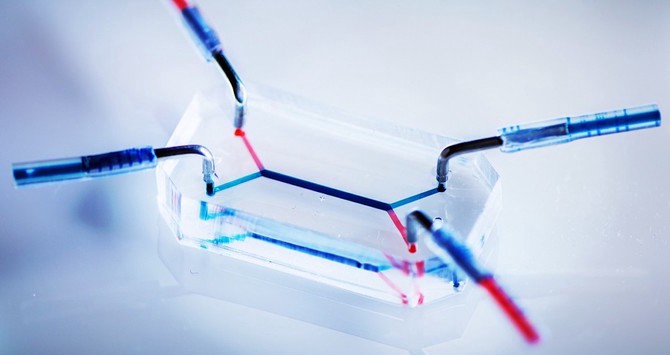
The Chan Zuckerberg Initiative (CZI) has announced $14 million in funding to support 29 interdisciplinary teams who are investigating the role of inflammation in disease. Among these recipients is Dan Huh, Associate Professor in Bioengineering, whose placenta-on-a-chip research will “explore how maternal and fetal cells respond to specific inflammatory signals and analyze the network of placental cells and immune cells that impact pregnancy outcomes in chronic inflammatory diseases.”
Kellie Ann Jurado, Presidential Assistant Professor in the Perelman School of Medicine’s Department of Microbiology, will lead the research team. She and Huh will collaborate with Monica Mainigi, William Shippen, Jr. Assistant Professor of Human Reproduction in Penn Medicine.

Huh’s placenta-on-a-chip consists of a small block of silicone containing microfluidic channels separated by a membrane of human cells. Variations in designs and cell types allow researchers to study how different molecules cross that barrier, allowing for experiments that would be otherwise impossible or unethical. For example, Huh and his group previously used a placenta-on-a-chip designed to model the placental barrier to research the effect of maternally-administered medications on the fetal bloodstream.
In this new study, Huh, Jurando and Mainigi were motivated by even more fundamental questions of pregnancy.
“It has been known for quite some time that women with chronic inflammatory diseases are at increased risk of developing various complications during pregnancy,” Huh says. “Despite accumulating clinical evidence, we understand little about how inflammation contributes to adverse pregnancy outcomes.”
Their CZI-funded study will be focused on the pro-inflammatory signaling molecule interferon and will require an even more specialized model of the placenta.
“One of the novel research tools we will be using for this study is a bioengineered model of the placenta at the earliest stage of pregnancy, what we’re calling an ‘implantation-on-a-chip,’ that can mimic the interface between maternal and fetal tissues after implantation of a fertilized egg,” Huh says. “This system will allow us to probe how interferon influences key physiological processes of early pregnancy.”
In the implantation-on-a-chip model, the two microfluidic channels are separated by a hydrogel scaffold made out of extracellular matrix proteins. Huh’s team grows human extravillous trophoblast cells on one side of the scaffold and endothelial cells on the other side. The three layers of cells and a hydrogel are used to mimic directional migration of the trophoblast cells from an embryo towards spiral arteries in the uterus after implantation.
“Knowing more about inflammation at the level of affected cells and tissues will increase our understanding of many diseases and improve our ability to cure, prevent or manage them,” said CZI Head of Science Cori Bargmann. “We look forward to collaborating with these interdisciplinary teams of researchers studying inflammation.”
The CZI funding will support these small teams to carry out two-year pilot projects focused on tissue-level inflammatory processes in diverse tissues and disease states. Pilot awards are intended to help new collaborations form, establish technologies and experimental methods, and frame key questions for further investigation.
